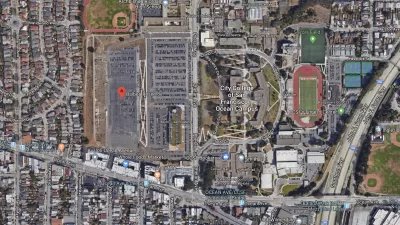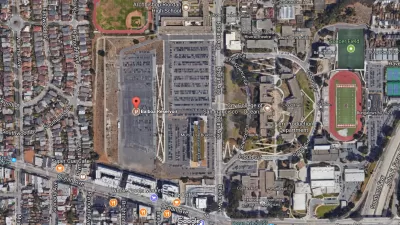A mega-project in San Francisco's South of Market neighborhood is exciting for its size an prize tag—and remarkable for the income levels that define "affordable" in San Francisco these days.

Cory Weinberg reports on the 5M mega-project on the way in San Francisco, after a key political victory that paved the way for its approval by the San Francisco Board of Supervisors.
The victory came in the shape of an agreement to build more apartments "dedicated to middle class residents." The $690 million project will now become "the largest ever affordable housing commitment that a San Francisco developer has made for a project built on private land."
Weinberg explains how the development will achieve its affordability targets: "40 percent of the units that will get built as a part of the project won’t be priced at market rate, and they will range in affordability. For instance, some units at an off-site Tenderloin affordable building will be reserved for formerly homeless residents, while a family of four making $152,850 a year would qualify for one of the middle-income units at one of the Fifth and Mission buildings."
The key phrase in there is "range in affordability," exemplified by the $152,850 annual salary being considered in the range of affordable anywhere on this planet.
For more on the project, including pretty renderings and more on some of the political process that got the development to this point, Curbed SF has been following the project closely for months.
FULL STORY: 5M megaproject clinches political victory by agreeing to build more middle-class apartments

Planetizen Federal Action Tracker
A weekly monitor of how Trump’s orders and actions are impacting planners and planning in America.

Maui's Vacation Rental Debate Turns Ugly
Verbal attacks, misinformation campaigns and fistfights plague a high-stakes debate to convert thousands of vacation rentals into long-term housing.

Restaurant Patios Were a Pandemic Win — Why Were They so Hard to Keep?
Social distancing requirements and changes in travel patterns prompted cities to pilot new uses for street and sidewalk space. Then it got complicated.

In California Battle of Housing vs. Environment, Housing Just Won
A new state law significantly limits the power of CEQA, an environmental review law that served as a powerful tool for blocking new development.

Boulder Eliminates Parking Minimums Citywide
Officials estimate the cost of building a single underground parking space at up to $100,000.

Orange County, Florida Adopts Largest US “Sprawl Repair” Code
The ‘Orange Code’ seeks to rectify decades of sprawl-inducing, car-oriented development.
Urban Design for Planners 1: Software Tools
This six-course series explores essential urban design concepts using open source software and equips planners with the tools they need to participate fully in the urban design process.
Planning for Universal Design
Learn the tools for implementing Universal Design in planning regulations.
Heyer Gruel & Associates PA
JM Goldson LLC
Custer County Colorado
City of Camden Redevelopment Agency
City of Astoria
Transportation Research & Education Center (TREC) at Portland State University
Jefferson Parish Government
Camden Redevelopment Agency
City of Claremont




























